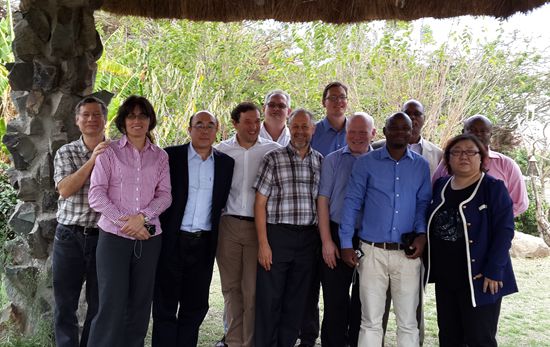分享到
HVRI to lead the Bill & Melinda Gates project on Contagious Bovine Pleuropneumonia BEN-1 Vaccine Evaluation
The Bill & Melinda Gates Foundation (BMGF) project on Contagious Bovine Pleuropneumonia BEN-1 Vaccine Evaluation was launched, with Harbin Veterinary Research Institute (HVRI) of Chinese Academy of Agricultural Sciences (CAAS) being the lead grantee in a consortium. The kick-off meeting of the BMGF project, held in Addis Ababa, Ethiopia in February, brought together experts from HVRI, African Union-Pan African Veterinary Vaccine Centre (PANVAC), French Agricultural Research Centre for International Development (CIRAD), International Livestock Research Institute(ILRI)and Global Alliance for Livestock Veterinary Medicines (GALVmed) and came out with the agreement to pilot CBPP vaccine in PANVAC. The total budget for the project is USD 1.8 million.

CBPP is a highly infectious disease of cattle caused by Mycoplasma mycoides subsp. mycoides (Mmm). It is a major constraint to cattle production in many areas of sub-Saharan Africa where 18 countries are reported to be affected by this disease. Estimates of the socio-economic impact of CBPP vary significantly with annual economic loss estimates ranging from $80 million to $2 billion worldwide. It is not only a question on the high mortality rates (50%), but also lack of ability of cattle to recover but remain chronic carriers of the disease for up to 2 years after initial infection. Besides, the vaccines against CBPP used in Africa have not being effective in prevent the CBPP’s spread, which cause CBPP a serious transboundary disease that spread and strike rapidly in other unaffected territories.

CBPP is a highly infectious disease of cattle caused by Mycoplasma mycoides subsp. mycoides (Mmm). It is a major constraint to cattle production in many areas of sub-Saharan Africa where 18 countries are reported to be affected by this disease. Estimates of the socio-economic impact of CBPP vary significantly with annual economic loss estimates ranging from $80 million to $2 billion worldwide. It is not only a question on the high mortality rates (50%), but also lack of ability of cattle to recover but remain chronic carriers of the disease for up to 2 years after initial infection. Besides, the vaccines against CBPP used in Africa have not being effective in prevent the CBPP’s spread, which cause CBPP a serious transboundary disease that spread and strike rapidly in other unaffected territories.
Latest News
-
 Apr 18, 2024Opening Ceremony of the Training Workshop on Wheat Head Scab Resistance Breeding and Pest Control in Africa Held in CAAS
Apr 18, 2024Opening Ceremony of the Training Workshop on Wheat Head Scab Resistance Breeding and Pest Control in Africa Held in CAAS -
 Apr 03, 2024IPPCAAS Co-organized the Training Workshop on Management and Application of Biopesticides in Nepal
Apr 03, 2024IPPCAAS Co-organized the Training Workshop on Management and Application of Biopesticides in Nepal -
 Mar 28, 2024Delegation from the School of Agriculture and Food Science of University College Dublin, Ireland Visit to IAS, CAAS
Mar 28, 2024Delegation from the School of Agriculture and Food Science of University College Dublin, Ireland Visit to IAS, CAAS -
 Mar 25, 2024Director of World Food Prize Foundation visited GSCAAS
Mar 25, 2024Director of World Food Prize Foundation visited GSCAAS -
 Mar 20, 2024Institute of Crop Sciences (ICS) and Syngenta Group Global Seeds Advance Collaborative Research in the Seed Industry
Mar 20, 2024Institute of Crop Sciences (ICS) and Syngenta Group Global Seeds Advance Collaborative Research in the Seed Industry
